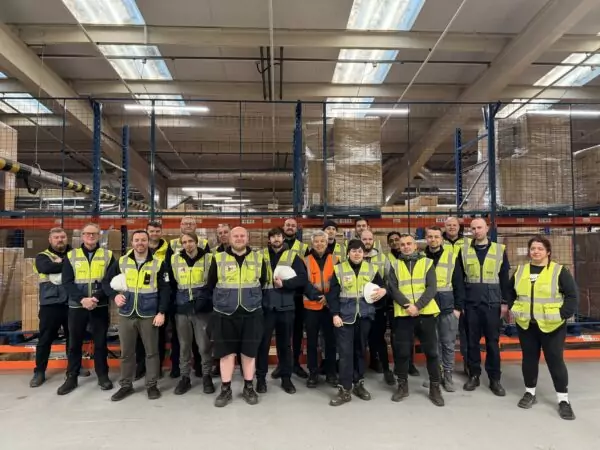
Reflecting on the past year, we dissected key challenges and executed strategic measures for our clients. The persistent global supply chain disruption became the new normal, necessitating a comprehensive approach to resilience and adaptability. Sustainability became a significant focus, emphasising swift implementation over mere conceptualisation. Reducing costs demanded innovative strategies in a low-growth sales environment, which we met head-on with tailored solutions. Technology-enabled transformation dominated, highlighting the imperative for businesses to embrace digital evolution, and the integration of Artificial Intelligence (AI) played a crucial role in navigating challenges, reinforcing our commitment to cutting-edge solutions.
The supply chain and procurement landscape was forced to evolve with the growing influence of e-commerce trends. Challenges encompassed managing cost inflation, navigating market uncertainty impacting forecasting and demand planning, and addressing geo-environmental issues. Our proactive strategies aim to provide clients with the resilience needed to thrive in a rapidly changing business environment.
David Clay, Supply Chain Consultant, reflects on notable changes in the supply chain landscape. David noted that “a recurring theme emerges: a considerable number of clients operated with minimal supply chain capabilities, be it in terms of people, processes, systems, or data. The challenge was to lead these organisations from minimal capability to a good level of operational proficiency. Global disruptions from the pandemic, fluctuating energy prices, and geopolitical challenges prompt industries less versed in supply chain intricacies to rethink their approaches. Supply chain capability has quickly risen on every organisation’s priority agenda, shifting from strategic consideration to a vital element for survival amid widespread uncertainty”.
Chris Dixon, Unipart Consultancy Director, examined the trends of 2023 and found two distinct groups emerge – the “Frozen” and the “Fighters.” Frozen companies adopted a minimal-cost approach, driven by uncertainty and overwhelming busyness. In contrast, Fighters embraced entrepreneurialism, seeking training and delivering quick-return projects to provide value in the current economic climate. Highlighting a successful initiative, we are proud to have contributed to the Health sector. Additionally, in the Aerospace industry, we innovatively found ways to support companies through Scope 3 supply chain environmental challenges.

Reflecting on 2023, a notable challenge for our clients was the growing realisation of environmental issues, with an understanding that this concern is likely accelerating. The importance of sustainability is poised to grow in 2024, aligning with best practices and standing as the morally right thing to do. In 2024, Chris anticipates a stagnant economy where businesses must demonstrate bravery, embrace change, and focus on upskilling. Strategically, businesses should shift from cost to value, using short-term improvements to fund larger transformations. Recognising that an environmentally balanced approach is often best practice and need not incur additional costs will be crucial for success.
Stewart Honour, Supply Chain Consultant, explains that 2023 was marked by significant uncertainty, impacting business investments. The end of an era of cheap finance, coupled with inflation, created an atmosphere of caution across all sectors, impacting consumer spending and wage growth. Echoing David’s insights, amidst these challenges, the focus pivoted towards short-term gains, with an emphasis on initiatives delivering immediate returns through people and process-oriented projects. Throughout 2023, businesses redirected their resources into procurement, a trend expected to persist into 2024. However, there was a notable divergence as supply chain activities received less attention. The implications of this shift are apparent, with the possibility that several senior hires from 2022 may have deferred their plans to transform supply chains, potentially leading to a surge in demand anticipated for 2024.
As we step into 2024, the economic landscape presents intriguing prospects, with inflation stabilising and a consensus forming that interest rates have reached their peak, poised to decline later in the year. This anticipated shift sets the stage for a resurgence in business investments, with the latter half of the year possibly witnessing an upswing in capital investment, particularly in IT and automation. Simultaneously, the ongoing discourse on immigration suggests a plateau in low-skilled migration, akin to pre-2005 dynamics, prompting businesses to reassess investment strategies.
Simon Phillips, Supply Chain Consultant, reflects on recent developments and highlights that our economy has revealed new fault lines, with well-known names disappearing from our High streets, exemplified by the case of Wilko. Simultaneously, the ongoing wars in Ukraine and Gaza-Israel have left a lasting impact on global supply chains, driving up supply costs and introducing uncertainty. The potential ramifications of these factors on commercial success necessitate careful management. Engaging with organisations within the healthcare sector has presented challenges and a critical need for support. Negotiating the delicate balance between “Process efficiency” and the intrinsic human-centric nature of “Patient Care and People needs” is an ongoing challenge.
Navigating the complexities of the future requires a strategic perspective, and the known/unknown matrix offers a valuable framework. Acknowledging that the entire future is uncertain, we find stability by focusing on the “Known Knowns” – the aspects we can identify. This approach allows us to channel our efforts into areas of certainty, making our strategies more resilient in the face of unpredictability. Recognising that our customers grapple with the same uncertainties, we draw parallels with unexpected historical events and their profound impact. Anticipating the unknowns of the coming year, we focus on current customer needs while maintaining a keen eye on the horizon. This dual perspective ensures that we address present concerns and remain agile and proactive in response to emerging “Known Knowns” that may shape the business landscape.
Connect with Chris Dixon, Unipart Consultancy Director, or James Stanley, Head of Strategy at Unipart Consultancy, to collaborate towards operational excellence, supply chain optimisation, or transformative strategies.
